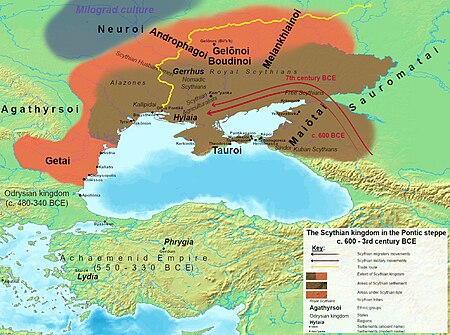
The Neuri or Navari (Ancient Greek: Νευροὶ, romanized: Neuroi; Latin: Neuri) were an ancient Slavic or Baltic people whose existence was recorded by ancient Graeco-Roman authors.
Identification
The Neuri belonged to a group of northern European peoples of unknown origin, but most researches propose an ethnic group ancestral to the Slavic, Baltic or larger Balto-Slavic peoples.
The Neuri lived in the region corresponding to present-day Belarus, in the territory including the Desna, Pripyat, and middle Dnieper rivers. To the south, the territory of the Neuri reached the upper section of the Southern Buh river.
The neighbours of the Neuri to the east of the Dnieper river were the Androphagi, the Melanchlaeni, and the Budini as well as Finno-Ugric peoples. Their neighbours were the Agathyrsi to the south-west, and the Scythian tribe of the Aroteres to the south-east.
History
The Neuri were independent of the Scythians.
According to Herodotus of Halicarnassus, the Neuri once had to leave their country because of an invasion of snakes.
When the Persian Achaemenid king Darius I attacked the Scythians in 513 BC, the Scythian king Idanthyrsus summoned the kings of the peoples surrounding his kingdom to a meeting to decide how to deal with the Persian invasion. The kings of the Budini, Gelonians and Sarmatians accepted to help the Scythians against the Persian attack, while the kings of the Agathyrsi, Androphagi, Melanchlaeni, Neuri, and Tauri refused to support the Scythians.
During the campaign, the Scythians and the Persian army pursuing them passed through the territories of the Melanchlaeni, Androphagi, and Neuri, before they reached the borders of the Agathyrsi, who refused to let the Scythian divisions to pass into their territories and find refuge there, thus forcing the Scythians to return to Scythia with the Persians pursuing them.
Legacy
The Neuri may have left traces of their presence in the region of the Desna, Pripyat, and middle Dnieper rivers in the form of Baltic-derived hydronyms and typonyms which pre-date the migration of Slavic peoples into this area. However, the presumed etymology of the tribal name, as well as other linguistic evidence, suggests that their legacy may be continued in the Slavic zone.
Society
Culture
According to the Greek author Herodotus of Halicarnassus, the Neuri followed Scythian customs. This claim might have referred only to the southernmost sections of the Neuri, who were neighbours of the Scythian Aroteres tribe.
Herodotus also claimed that the Neuri "seemed to be magicians," and that all members of their tribe would allegedly each year transform themselves into wolves for some days before being restored to their human form. This might suggest that the Neuri performed cults in which they wore wolf skins and masks, and that the wolf might have been a totem animal of this tribe.
Archaeology
The Neuri archaeologically correspond to the Milograd culture.
The southernmost of part of the Milograd culture, which adjoined the territory of the Scythian Aroteres, included many Scythian elements.
References
- Pekkanen, Tuomo (1968). The Ethnic Origin of the [Doulosporoi]. Klassillis-filologinen yhdistys.
- Payton, James R. (2021-11-03). The Unknown Europe: How Eastern Europe Got That Way. Wipf and Stock Publishers. ISBN 978-1-6667-0475-4.
- ^ Sulimirski 1985, p. 153.
- ^ Sulimirski 1985, p. 184.
- ^ Sulimirski 1985, p. 185.
- Sulimirski 1985, p. 183.
- ^ Sulimirski & Taylor 1991, p. 585.
- ^ Parzinger 2004, p. 72-73.
- ^ Herodotus & Godolphin 1973.
- Fol & Hammond 1988, p. 241.
- Bojtar, Endre (2000-01-01). Foreword to The Past: A Cultural History of the Baltic People. Central European University Press. ISBN 978-963-7326-18-9.
Sources
- Fol, Alexander; Hammond, N. G. L. (1988). "Persia in Europe, Apart from Greece". In Boardman, John; Hammond, N. G. L.; Lewis, D. M.; Ostwald, M. (eds.). Persian, Greece and the Western Mediterranean, c. 525 to 479 B.C. The Cambridge Ancient History. Vol. 4. Cambridge: Cambridge University Press. pp. 234–253. ISBN 978-0-521-22804-6.
- Herodotus; Godolphin, Francis R. B. (1973). "Herodotus: On the Scythians". The Metropolitan Museum of Art Bulletin. 32 (5): 129–149. doi:10.2307/3269235. JSTOR 3269235. Retrieved 26 November 2021.
- Parzinger, Hermann (2004). Die Skythen [The Scythians] (in German). Munich, Germany: Verlag C.H.Beck. ISBN 978-3-406-50842-4.
- Sulimirski, T. (1985). "The Scyths". In Gershevitch, I. (ed.). The Median and Achaemenian Periods. The Cambridge History of Iran. Vol. 2. Cambridge, United Kingdom: Cambridge University Press. pp. 149–199. ISBN 978-1-139-05493-5.
- Sulimirski, Tadeusz; Taylor, T. F. (1991). "The Scythians". In Boardman, John; Edwards, I. E. S.; Hammond, N. G. L.; Sollberger, E.; Walker, C. B. F. (eds.). The Assyrian and Babylonian Empires and other States of the Near East, from the Eighth to the Sixth Centuries B.C. The Cambridge Ancient History. Vol. 3. Cambridge, United Kingdom: Cambridge University Press. pp. 547–590. ISBN 978-1-139-05429-4.
| Balts | ||
|---|---|---|
| Ethnic groups |  | |
| Countries | ||
| Languages | ||
| Tribes | ||
| Religion | ||